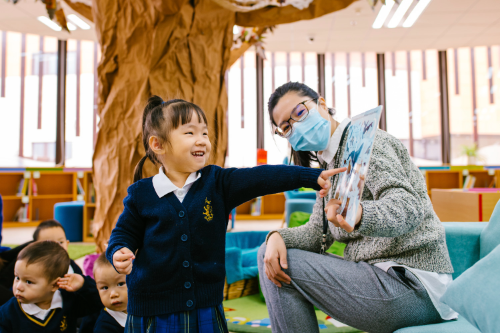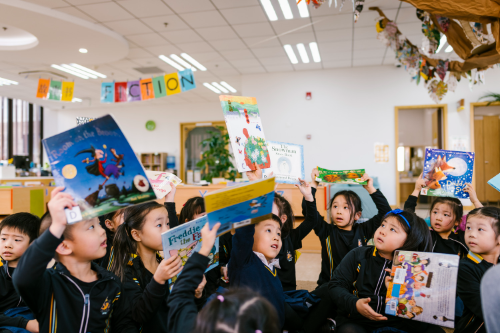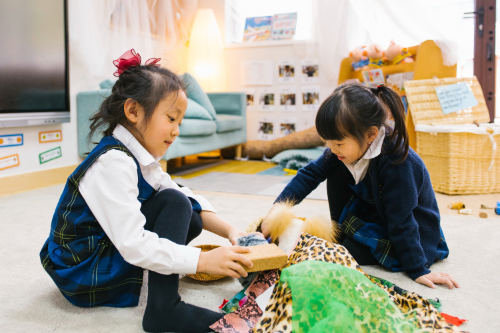
Steffen Eichhorn
EY3 Classroom Teacher
To write about Learning Adventures at Hiba Academy Shanghai, we have to go all the way back to 2018 to our Wellington College Festival of Education. This was when the idea of learning adventures was born in a room that was filled to the rim with specialist educators from around the world.
As a team of educators, we had been considering how best to extend the pedagogical approach of StoryTalk to meet the needs of the older pupils at the nursery. We wanted to take the fundamentals of how sources of literature can be threaded into learning and amend the concept so that the literature sources resulted from the pedagogical approach used.

Hywel Roberts the author of Oops! and co-author of Unchartered Territories (with Debra Kidd) held a very compelling and thought-provoking session on how to engage children in their learning. He was talking about ‘botheredness’.
The room was crammed with listeners keen to hear words of wisdom from a revered author, and people were sitting on the floor and even standing at the back, to gain some insights. Simply with words, Hywel and his co-speaker transported us to another world where…
…they got us to imagine the hot beaming rays of sunlight. Looking around you, there is nothing but the green of the vast valley. In your ear, the chirps of crickets rubbing their legs for the most beautiful sounds. Blissful birds somersaulting in the blue sky, chirping as they are chasing each other in play. The mountains, still carrying the white blanket of snow, are standing tall into the clouds like big protectors that have guarded the valley from the outside world for decades.
From close by, you can hear the bubbling creek that has provided our valley with water from the mountains since our father’s father and mother’s mother settled down here. Our village is not big, but full of community and sense of belonging. We are proud of what we have accomplished as we cultivated the land around us to fit our needs. Fields with rich crops, fishing nets in the creek and land for our cattle to feed on.
When you follow the valley to the south, you will find the forest that has provided us with the wood we need to build our houses. There is, however, a legend around this forest…we have been sharing this legend in our families for generations. Deep in the woods, where no sunlight hits the ground and the leaves of the trees form a green umbrella, there in the dark lives a horrible monster. An ogre as tall as two men with scarlet red skin, teeth as big as your hand and blue claws on his hands and feet. We do not go deep in the forest…

The story continued and the audience was quietly surprised to hear that one day the monster visited the people in their village. Apparently, it had grown tired of us chopping down trees in his forest as more of his animal friends, the only friends he had and could talk to, had left because of it. Over time as we have taken more trees for our houses, furniture and fences, we have also come closer to his house. We were faced with a problem. Should we continue to get our wood out of the forest and risk the seemingly kind ogre becoming angry with us and hurting us, or should we listen to the ogre, but where should we get the wood from that we need to build houses for our village?
At this point, you might already see how Hywel had involved us in the story, how we were invested in the problem and how he secretly snuck in learning and problem solving. He explains it as ‘accidental learning’, because as we are trying to solve the problem of our village, we are unavoidably talking about diplomatic skills, architecture and building material, geography, understanding the world; there is chance for including maths, reading and writing skills hidden in this adventure. The actual magic lies in the investment and how – because we give a reason and a purpose – our children are much more likely to engage in these learning opportunities, because they want to, because they care.
‘Botheredness’ can be best explained by involvement or even investment in learning. When children (or adults for that matter) are really invested in their learning (or work) they are much more likely to have the willingness to join in activities and drive their own learning forward. As teachers, we are striving to re-create this moment for our children and create the most inspiring learning approach for our little ones. It is this teaching of how to love learning and momentum of curiosity that creates the opportunity to make our children investigative life-long, self-driven learners.
Over a year after our initial collaboration with Hywel, we were now faced with the challenge to adapt his approach and make it accessible to our children. Starting from the child, we quickly noticed that we had to give our children a solid foundation of knowledge and skills in order for each of them to access our journey and be part of our team of experts on our quests.

How does it look in our classroom?
We begin by asking our children questions about their interests and what things they would like to learn about. Based on that we then develop a progression that often starts with talking about their knowledge about the topic or theme they are curious about and simultaneously introducing vocabulary in English to give everyone a chance to also join in with their second (or third) language. These word banks are then displayed in the classroom for children to revisit over the course of the learning adventure. We support this by reading stories and non-fiction books linking to our adventure to consolidate children’s learning.
This pre-work is paramount and enables us to differentiate for every child in the classroom. It also allows all our children to access our adventures as it creates a metaphorical ‘box’ of thinking for them in which they are comfortable and confident with their skills and knowledge, before thinking ‘outside the box’ and taking the risk to solve problems once we are on our journey through our adventure.
Our adventure then starts by posing a problem or question to our children. One of our first learning adventures this year, led us all the way into a distant jungle. A very famous scientist sent us a video message inviting us on a hunt of a completely new species into parts of the tropical rainforest that no one ever has been to before. The children had to be very strategic about what to pack for the journey, what dangers you might encounter in the jungle and what to do once we finally find the creature. The children were especially engaged in creating their own species and giving it new names along with using their new language to describe the animal to us.
When we talk about independent play-based learning, this is what it means to us. The children are presented with abundant opportunities to think for themselves, to challenge themselves to overcome initial obstacles of learning by leaving the outcome open. The choice is theirs. There is no fixed result or endpoint, and it is the adventure and process where we see each and every child’s ability with opportunity to gently support them with impactful and engaging adult interactions in their learning along the way. Additionally, we equip our environment to complement the adventure with plenty of opportunities to add any element to the journey.
The adventure lives in every aspect of the environment and in the mind of every adult in the room, thereby facilitating the journey and encouraging ‘botheredness’ in every child to make their learning magical and unique.